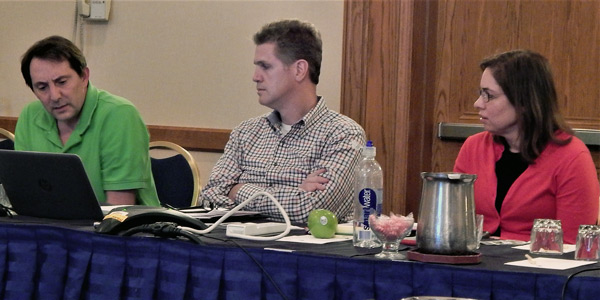By Tom Kleckner
TULSA, Okla. — SPP’s Z2 Task Force last week conducted a series of votes to determine potential alternatives to the RTO’s cumbersome crediting system for transmission upgrades in time for a July deadline.
The group’s consensus is that incremental long-term congestion rights (ILTCRs) modeled after the RTO’s LTCR process and some modifications to the Z2 process are the best options for moving forward.
“We’re separating the must-haves from the nice-to-haves,” Kansas City Power & Light’s Denise Buffington, the task force’s chair, told the Markets and Operations Policy Committee on April 12.
Under Attachment Z2 of the RTO’s Tariff, members are assigned financial credits and obligations for sponsored upgrades. The task force is trying to simplify the process — which resulted in eight years of incorrectly applied credits — while still meeting FERC requirements.
It hasn’t been easy.
“It’s a mess of complexity,” SPP’s Charles Locke said, referring to three different funding mechanisms for the Z2 process: base plan, directly assigned costs and point-to-point clawbacks under various Tariff schedules.
“I’m not interested in coming to another meeting with more data and more proposals, and [having] another discussion on why we don’t like the process,” Buffington said, keeping the group on task during its meeting before the MOPC session.
After “spirited discussion,” as Buffington described it to the MOPC, the task force approved:
- Replacing the existing Z2 process with ILTCRs for all three upgrade types (sponsored, transmission service and generator interconnections). Doing so would require a secondary market to trade the ILTCRs and make them fully transferable, following examples set by MISO, PJM and other RTOs. Staff proposed using a modified ILTCR process for generator interconnection upgrades and the existing process for the other two upgrades but said it would need further study and software changes costing hundreds of thousands to implement all three categories.
- A rate allocation similar to the Tariff’s schedules 11 and 13 for all three categories, with a limited roll-in of the facilities’ cost, depending on the extent to which it is used for subsequent transmission service. The proposal is focused on compensating service-upgrade sponsors, but it could be used for the other two categories.
- Consideration of a standard credit payment rate that would put point-to-point payment obligations on par with network obligations.
- Eliminating credits for short-term transmission service by decoupling a short-term transfer tool from the credit stacking system. Short-term impacts will no longer be “stacked” to determine when a creditable upgrade becomes reverse creditable. Staff assumes “fairly minimal” changes with this option and said it could take as little as two months to implement.
- Eliminating credits for non-capacity upgrades.
The task force has scheduled two additional meetings to make a final decision and put together a final recommendation for the MOPC and Board of Directors meetings in July.






